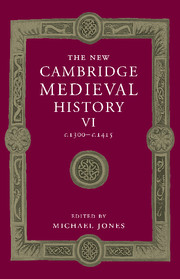Book contents
- Frontmatter
- Part I General Themes
- Part II The States of the West
- Part III The Church and Politics
- Part IV Northern and Eastern Europe
- 21 Baltic Europe
- 22 The Kingdoms of Central Europe in the Fourteenth Century
- 23 The Principalities of Rus’ in the Fourteenth Century
- 24 The Byzantine Empire in the Fourteenth Century
- 25 Latins in the Aegean and the Balkans in the Fourteenth Century
- 26 The Rise of the Ottomans
- 27 Christians and Muslims in the Eastern Mediterranean
- Appendix Genealogical Tables
- Primary Sources and Secondary Works Arranged by Chapter
- Index
- Frontispiece
- Plate section
- Map 4 Europe's trade, c. 1300
- Map 5 Europe's trade, c. 1400
- Map 7 The Hundred Years War to 1360
- Map 15 Russia, c. 1396
- Map 17 The Byzantine empire in the 1340s
- References
26 - The Rise of the Ottomans
from Part IV - Northern and Eastern Europe
Published online by Cambridge University Press: 28 March 2008
- Frontmatter
- Part I General Themes
- Part II The States of the West
- Part III The Church and Politics
- Part IV Northern and Eastern Europe
- 21 Baltic Europe
- 22 The Kingdoms of Central Europe in the Fourteenth Century
- 23 The Principalities of Rus’ in the Fourteenth Century
- 24 The Byzantine Empire in the Fourteenth Century
- 25 Latins in the Aegean and the Balkans in the Fourteenth Century
- 26 The Rise of the Ottomans
- 27 Christians and Muslims in the Eastern Mediterranean
- Appendix Genealogical Tables
- Primary Sources and Secondary Works Arranged by Chapter
- Index
- Frontispiece
- Plate section
- Map 4 Europe's trade, c. 1300
- Map 5 Europe's trade, c. 1400
- Map 7 The Hundred Years War to 1360
- Map 15 Russia, c. 1396
- Map 17 The Byzantine empire in the 1340s
- References
Summary
the historical setting
the Ottomans emerged around 1300 and, after a century of continuous territorial enlargement and institutional development, their enterprise almost came to a premature end in 1402 when their army was defeated and their rule was shattered by Timur’s (Tamerlane) formidable blow. Thus the fourteenth century exactly framed the first phase in the evolution of the Ottoman state when a small band of frontiersmen succeeded in establishing a sizeable regional state in Anatolia and in the Balkan peninsula.
The origins of the state are obscure because, at first, it was such an insignificant entity. Histories written in the cultural and political centres of the Islamic world, in Tabriz and Damascus and Cairo, did not take notice of the distant frontier zone in western Anatolia. Ottomans themselves did not put their own history in writing until the mid-fifteenth century, though there is evidence of a lively oral tradition. Some modern historians, in fact, consider these later histories practically worthless in explaining Ottoman origins. Archival evidence, too, is scant; few of the documents purporting to be from the fourteenth century but preserved as copies in later collections have been authenticated by rigorous scrutiny. The historian’s task, however, is not hopeless: recent research tends to corroborate the accounts of later Ottoman chronicles; modern historiography has also successfully integrated historical traditions with evidence from diverse sources, Byzantine and Islamic.
- Type
- Chapter
- Information
- The New Cambridge Medieval History , pp. 839 - 863Publisher: Cambridge University PressPrint publication year: 2000



